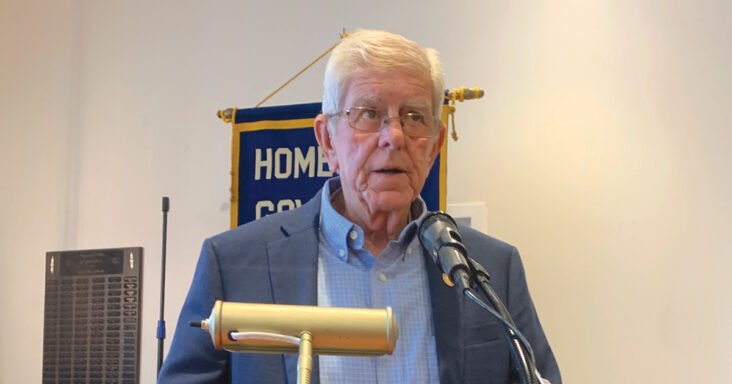Rep. Dwight Tosh discusses legislative wins in 2023 session
by July 11, 2023 9:42 am 2,081 views

The recent legislative session was dominated by social and political issues that ranged from transgender rights to the banning of certain books in libraries across the state. The most significant piece of legislation that was passed, the LEARNS Act, will significantly alter the way education is delivered in Arkansas if it passes all legal tests.
A total of 889 bills were passed during the session. Many are obscure changes that don’t seem as important as the bigger issues that made statewide and national news, but they have impacts too, Rep. Dwight Tosh, R-Jonesboro, told Talk Business & Politics.
The five-term state representative was among the most active of his colleagues in terms of sponsoring bills, he said. He estimated he sponsored about 15 bills. Of the ones passed, he said three stood out.
“I ran a lot of bills,” Tosh said. “I think I was one of the most active during the session.”
One bill he sponsored made the coroner’s report in a homicide investigation not subject to Arkansas’s Freedom of Information Act or FOIA statutes.
The FOIA was established in 1967. It is a series of laws designed to guarantee that the public has access to public records of governmental bodies. Arkansas defines public records as “writings, recorded sounds, films, tapes, electronic or computer-based information, or data compilations in any medium required by law to be kept,” according to the National Freedom of Information Coalition.
There are exceptions to the Act. Some exemptions include state tax records, medical/adoption/education records, archaeological and historical information, grand jury minutes, unpublished drafts of judicial opinions, undisclosed police investigations, information that would create unfair competition, identities of undercover law enforcement, computer security information, home addresses of non-elected employees, license examinations, military service discharge information, or records relevant to the security of public infrastructure, the NFIC states.
In an unsolved homicide investigation, the medical examiner’s report is not subject to FOIA and neither is any material generated by law enforcement generated during the investigation.
However, there was a legal interpretation that surfaced that stated the coroner’s report, which can contain significant details of an investigation, may not fall under the umbrella of non-disclosure, Tosh said.
A 37-year veteran of the Arkansas State Police, Tosh said he knew how vitally important it is to maintain the integrity of investigations. Law enforcement often solves cases with the use of “Hold back information” meaning not disclosing details about a crime to the public that only the perpetrator would know.
Tosh said a prime example of how it could hurt an investigation happened many years ago when he was still working with the ASP. A police officer had been shot in the Jonesboro area, and law enforcement had few leads as to who did it. A man came to the ASP unit and confessed to the crime. There was only one problem. None of the facts he gave matched the evidence. He was falsely confessing to the crime. The coroner’s report would have contained those vital details and if it was subject to FOIA, the man could have been charged with a crime he didn’t commit.
“It’s a critical part of an investigation that doesn’t need to be released until the investigation is complete,” he said.
To thwart any potential opposition, Tosh said he approached the Arkansas Press Association for input. The organization helped to write the language in the bill, and when it was done it supported its passage, he said. The bill sailed through the House and Senate.
“It meant a lot when the Arkansas Press Association got behind it,” he said.
Tosh was approached by a constituent who had a unique problem. The woman was a former drug addict who had successfully rehabilitated her life. She wanted to serve as a peer advisor in a rehabilitation program, but state law doesn’t allow people who’ve been convicted of violent crimes to serve in those positions.
Virtually all crimes contain an element of violence, and many convicted criminals won’t commit a violent act again, Tosh said. The chances of rehabbing someone addicted to drugs increase when they have peers to lean on that have been down the same path, he said.
“Those are the people we need going back into the system to help … They understand where that person is coming from. We can only guess. Those people know,” Tosh said.
He sponsored a bill that allows the Department of Human Services to vet possible peer advisers who’ve been previously convicted of crimes that might involve some form of violence. The bill would pass and become law. A third piece of legislation he got passed was a bill that will ask the federal government to issue a waiver when it comes to disabled veteran’s incomes. Tosh learned of a veteran who had lost his legs in combat and he applied for SNAP benefits. But there was a problem.
The veteran and his family didn’t qualify because his disability check was too high. The bill allows DHS to ask the federal government for a waiver in cases like this so that the disability income doesn’t count. Tosh said he knows the bill was a long shot, and the federal government will likely not change any SNAP requirements, but he said it was worth a try.
“These veterans took a shot for all of us … we need to take a shot for them,” he said. “That check is not enough for the sacrifice that man made for us.”
